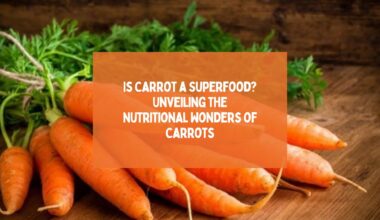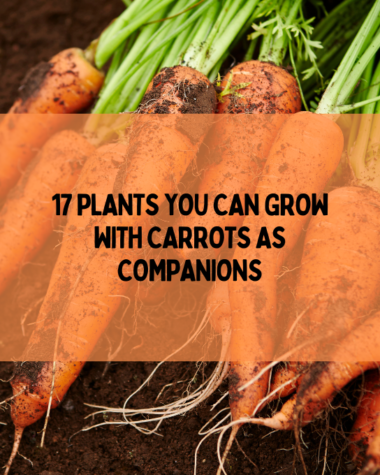Carrots are an excellent source of many important vitamins and minerals. They are especially rich in vitamin A, which is essential for good eyesight, healthy skin, and a strong immune system. Vitamins are essential for blood clotting and bone health, support the immune system, and maintain healthy skin.
Carrots contain small amounts of other important vitamins, including B vitamins, vitamin E, vitamin K, and vitamin D. Eating carrots regularly can help provide your body with the essential vitamins it needs to function properly. Source: Health and Social Services
In this article, I will tell you about the vitamins that are present in carrots and their proper roles in our bodies.
Let’s start.
6 Main Vitamins In Carrots And Their Role

There are many vitamins like vitamin A, B, E, D, and K that are present in carrots, but some are given below with a detailed explanation:
1. Vitamin A
- Carrots are one of the richest sources of vitamin A, which is essential for good health.
- It is a fat-soluble vitamin that plays an important role in maintaining vision, skin, and immune function.
- The body converts beta-carotene into vitamin A and the body uses this for different functions.
- Eating carrots regularly prevents night blindness, and supports a strong immune system.
- Vitamin A is also found in other orange and yellow vegetables, as well as in dairy products and liver.
2. Vitamin K1
- Carrots are a good source of vitamin K1, which is essential for blood clotting and bone health.
- Vitamin K1, also known as phylloquinone, is a fat-soluble vitamin.
- It is found in high amounts in leafy green vegetables such as spinach, kale, and collard greens.
- Carrots contain smaller amounts of vitamin K1, but they still contribute to overall vitamin K intake.
- Vitamin K1 prevents excessive bleeding and plays a role in maintaining bone health by regulating calcium levels in the body.
- Carrots into a balanced diet can help ensure adequate intake of vitamin K1 and support overall health.
Related Reading
- How To Harvest Carrots In Your Garden?
- How To Improve Soil Quality To Grow Carrots?
- The Ultimate Guide To Growing Carrots In Your Garden
- Why Carrots And Radish Are Better Off Without Transplanting?
3. Vitamin C
- Vitamin C in carrots which is an important antioxidant that supports immune function and helps maintain healthy skin.
- It is also known as ascorbic acid, is a water-soluble vitamin that plays a role in the growth, development, and repair of the tissues in the body.
- It also helps the body absorb iron from plant-based foods, which is important for healthy blood cells.
- Carrots are not as high in vitamin C as some other fruits and vegetables, such as oranges or bell peppers, they still provide a valuable source of this essential nutrient.
4. Vitamin B6
- Carrots are not a significant source of vitamin B6, they do contain small amounts of this important nutrient.
- Vitamin B6, also known as pyridoxine, is a water-soluble vitamin that is involved in performing many functions of the body.
- It helps the body produce neurotransmitters, which are important for communication between nerve cells, and it also plays a role in the production of red blood cells.
- Vitamin B6 also supports immune function and helps maintain healthy skin.
- Carrots may not be a major source of vitamin B6, but they are still a valuable addition to a balanced diet, including vitamins and minerals.
5. Folate
Carrots contain folate, which is a B vitamin that is essential for healthy growth and development. Folate plays a role in the production of DNA and RNA, which are the building blocks of cells.
It is especially important during pregnancy, as it helps prevent birth defects in the developing fetus. While the amount of folate in carrots may be small, it still contributes to overall folate intake. Folate is found in a variety of foods, including green vegetables, fruits, and grains.
6. Vitamin E
- Carrots contain vitamin E, which is a fat-soluble vitamin and antioxidant that helps protect the body against oxidative damage.
- Vitamin E helps maintain healthy skin, hair, and eyes, and it also plays a role in supporting immune function.
- It is commonly found in plant-based oils, nuts, and seeds, but carrots can also contribute to overall vitamin E intake.
- Vitamin E is a nutritious and healthy addition to a balanced diet.
Other Nutrients That Are Present In Carrot

The nutrients present in carrots besides vitamins include lycopene, polyacetylenes, anthocyanins, potassium, lutein, alpha-carotene, and beta-carotene. These are explained below;
- Lycopene: This is a powerful antioxidant that gives fruits and vegetables their red color. It may help reduce the risk of certain cancers and protect against heart disease.
- Polyacetylenes: These are natural compounds found in carrots that may have anti-inflammatory properties and help protect against cancer.
- Anthocyanins: These are pigments that give certain fruits and vegetables their vibrant colors. They may have antioxidant effects and help improve cognitive function.
- Potassium: This mineral is important for regulating blood pressure, supporting heart health, and helping with muscle and nerve function.
- Lutein: This is a carotenoid that is important for eye health and may help protect against age-related macular degeneration.
- Alpha-carotene and beta-carotene: These are both provitamin A carotenoids that are converted into vitamin A in the body. They are important for immune function, vision, and skin health.
Nutrition Facts In Carrots
Here are some of the key nutrition facts for carrots:
One medium carrot (approximately 61 grams) contains;
- 25 calories
- 6 grams of carbohydrates
- 1 gram of protein
- 0.2 grams of fat
- 2 grams of fiber
Carrots are a good source of potassium and provide small amounts of other minerals like calcium, magnesium, and phosphorus.
Carrots are low in calories and carbohydrates, making them a great snack or managing their blood sugar levels.
Related Reading
- The Incredible Benefits of Providing Aubergine Plant Support
- The Fascinating Story of Purple Tomatoes: Genetics and Cultivation
- Why Are My Zucchini Plant Wilting?
- Everything You Need to Know About Baby Cucumbers
Conclusion
Carrots are a nutritious and healthy addition to any diet. They are packed with a range of important vitamins and minerals that contribute to overall health and wellbeing. Carrots can be enjoyed in a variety of ways, from raw as a snack to cooked as a side dish.
By incorporating carrots into your diet, you can help ensure adequate intake of these essential nutrients.
FAQs
Here are some faqs about vitamins in carrots.
How should I store carrots to preserve their nutrients?
Carrots should be stored in the refrigerator in a plastic bag or container. They can also be stored in cool, dark places. Avoid exposing them to light, as this can cause them to lose their vitamin A content.
How much vitamin A is in a serving of carrots?
A half-cup serving of cooked carrots contains approximately 671 micrograms of vitamin A, which is over 100% of the recommended daily intake for adults.
Can eating too many carrots be harmful?
Eating large amounts of carrots can cause a condition called carotenemia, which causes the skin to turn yellow-orange. However, this is rare and typically only occurs with excessive consumption of carrots or other orange or yellow vegetables.







